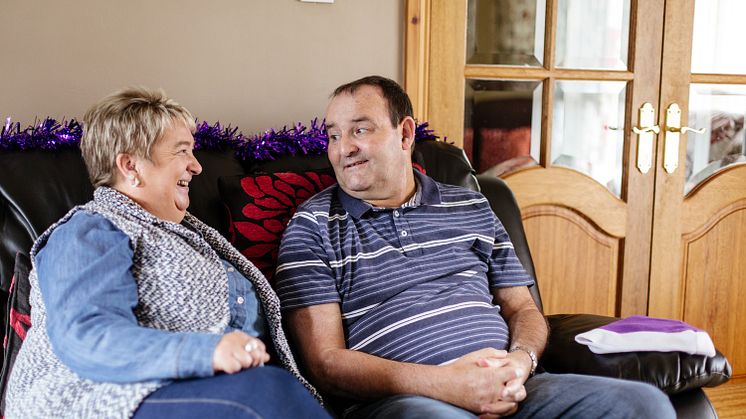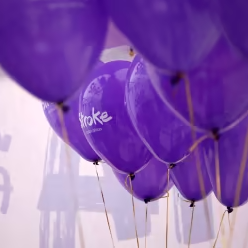
Press release -
Dundonald stroke survivor adds their voice to Lost for Words campaign
Press release
14.11.2016
Dundonald stroke survivor Andrew McCracken, 55 is one of the thousands of people living with communication difficulties after a stroke in Northern Ireland.
Dad of two Andrew had a stroke in January 2013 which left him unable to talk, move or walk. Previously a successful business owner and keen golfer, Andrew no longer works and finds social occasions difficult as it isn’t always easy to follow the conversation and explain what he wants to say.
Andrew is learning new ways to communicate thanks to the support of local speech and language therapists. And now the Dundonald man is backing the Lost for Words campaign by the Stroke Association to raise awareness of the challenges stroke survivors with communication difficulties can face, and the help and support available.
Andrew’s wife Amanda said: “Andrew was in hospital for a routine outpatient procedure when I got the call that he’d taken ill. I was out doing some shopping in the post-Christmas sales and waiting to hear from him. The hospital called to say they thought Andrew was having a stroke. It was terrifying. He was rushed to the Stroke Unit at the Ulster Hospital and then on to the Royal Victoria Hospital for life saving clot retrieval treatment. He was in intensive care for two weeks and spent another three months in the Regional Acquired Brain Injury Unit at Musgrave Park Hospital. It was a very scary time”.
After his stroke Andrew was lost for words and unable to communicate with his family.
Amanda added: “Andrew couldn’t talk or move. There was just noise and a few small words but he wasn’t making sense. Andrew was getting very frustrated that we didn’t understand what he wanted or what he was trying to tell us. It was very difficult to adapt to this new phase of our life but we found ways to understand each other and we’re grateful for the help we’ve received”.
When Andrew was discharged from hospital he received some speech and language therapy at home and was then referred to the Stroke Association.
The Stroke Association’s Speech and Language programme is a professionally led service designed to support people affected by communication disability in a group environment using a range of creative approaches to improve memory, enhance communication skills and build confidence post stroke. The group is partially funded by the Belfast Health and Social Care Trust and aims to reduce the disability associated with stroke and build self-esteem as well as supporting carers living with the effects of stroke.
Andrew enjoys the group and says it’s helped him to learn new ways to communicate – such as using gesture and relearning some words. “I enjoy the craic at the group and everyone there knows what it’s like to have had a stroke. Stroke has had a big impact but I’m feeling positive about the future”.
Brenda Maguire at the Stroke Association, said: “After a stroke, around one in three people have difficulty speaking or understanding. This can be terrifying and isolating, which is devastating at any time, but particularly so at Christmas when there are lots of social events and family gatherings. When we first started supporting Andrew he was unable to communicate. But since he’s been attending our Belfast group, he’s gone from strength to strength and got some words back. We’re delighted that Andrew is backing our Lost for Words campaign. His story is being shared around the UK via our campaign and will surely inspire others at the beginning of their recovery”.
More than 350,000 people in the UK have aphasia, a communication disability which can be caused by stroke. The Stroke Association is urging people to show their support for stroke survivors who are lost for words and make a donation. For more information, visit www.stroke.org.uk/lostforwords.
Topics
Categories
Regions
A stroke is a brain attack which happens when the blood supply to the brain is cut off, caused by a clot or bleeding in the brain. There are around 152,000 strokes in the UK every year and it is one of the largest causes of disability. There are over 1.2 million people in the UK living with the effects of stroke.
Stroke Association is a charity. We believe in life after stroke and together we can conquer stroke. We work directly with stroke survivors and their families and carers, with health and social care professionals and with scientists and researchers. We campaign to improve stroke care and support people to make the best recovery they can. We fund research to develop new treatments and ways of preventing stroke. The Stroke Helpline (0303 303 3100) provides information and support on stroke. More information can be found at www.stroke.org.uk











